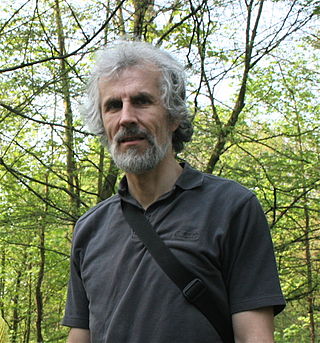Systems theory is the transdisciplinary study of systems, i.e. cohesive groups of interrelated, interdependent components that can be natural or artificial. Every system has causal boundaries, is influenced by its context, defined by its structure, function and role, and expressed through its relations with other systems. A system is "more than the sum of its parts" by expressing synergy or emergent behavior.

Systems Science, also referred to as systems research, or, simply, systems, is a transdisciplinary field that is concerned with understanding simple and complex systems in nature and society, for which leads to the advancements of formal, natural, social, and applied attributions throughout engineering, technology and science, itself.

Béla Heinrich Bánáthy was a Hungarian-American linguist, and Professor at San Jose State University and UC Berkeley. He is known as founder of the White Stag Leadership Development Program, established the International Systems Institute in 1982, and was co-founder of the General Evolutionary Research Group in 1984.

Erich Jantsch was an Austrian-born American astrophysicist, engineer, educator, author, consultant and futurist, especially known for his work in the social systems design movement in Europe in the 1970s.
Systems philosophy is a discipline aimed at constructing a new philosophy by using systems concepts. The discipline was first described by Ervin Laszlo in his 1972 book Introduction to Systems Philosophy: Toward a New Paradigm of Contemporary Thought. It has been described as the "reorientation of thought and world view ensuing from the introduction of "systems" as a new scientific paradigm".

Francis Paul Heylighen is a Belgian cyberneticist investigating the emergence and evolution of intelligent organization. He presently works as a research professor at the Vrije Universiteit Brussel, where he directs the transdisciplinary "Center Leo Apostel" and the research group on "Evolution, Complexity and Cognition". He is best known for his work on the Principia Cybernetica Project, his model of the Internet as a global brain, and his contributions to the theories of memetics and self-organization. He is also known, albeit to a lesser extent, for his work on gifted people and their problems.

Ervin László is an American philosopher of science, systems theorist, integral theorist, originally a classical pianist. He is an advocate of the theory of quantum consciousness.
Charles François was a Belgian administrator, editor and scientist in the fields of cybernetics, systems theory and systems science, internationally known for his main work the International Encyclopedia of Systems and Cybernetics.
Debora Hammond is an American historian of science, former Provost and Professor Emerita of Interdisciplinary Studies of the Hutchins School of Liberal Studies at the Sonoma State University. She is known as author of the 2003 book The Science of Synthesis: Exploring the Social Implications of General Systems Theory, and as 2005–06 President of International Society for the Systems Sciences.
The International Society for the Systems Sciences (ISSS) is a worldwide organization for systems sciences. The overall purpose of the ISSS is:
to promote the development of conceptual frameworks based on general system theory, as well as their implementation in practice. It further seeks to encourage research and facilitate communication between and among scientists and professionals from various disciplines and professions at local, regional, national, and international levels.
Kyoichi Jim Kijima is a Japanese systems scientist and professor of Decision Systems Science at the Tokyo Institute of Technology.
Béla Antal Bánáthy is an American systems scientist, who teaches part-time at the International Systems Institute at the Saybrook Graduate School.

Gary S. Metcalf is an American systems scientist, organizational theorist, management consultant, and university professor. He has served as president of the International Federation for Systems Research 2010-2014.
Gu Jifa is a Chinese systems scientist, and Professor of Operations Research and Systems Engineering at the Institute of Systems Science, Academy of Mathematics and System Sciences, Chinese Academy of Sciences. He is known for hs proposal of the "oriental Wu-li Shi-li Ren-li system approach." He is an academician of the International Academy for Systems and Cybernetic Sciences.
Peter Andrew Corning is an American biologist, consultant, and complex systems scientist, Director of the Institute for the Study of Complex Systems, in Seattle, Washington. He is known especially for his work on the causal role of synergy in evolution.

Lenard Raphael Troncale is an American biologist, systems theorist, Professor Emeritus of Cellular and Molecular Biology, and former Director of the Institute for Advanced Systems Studies at the California State Polytechnic University.

David Ing is a Canadian systems scientist, business architect, management consultant, and marketing scientist. He served as president of the International Society for the Systems Sciences (2011-2012).
David Elliot Loye was an American author, psychologist, and evolutionary systems scientist.

Allan Combs is an American psychologist and parapsychologist who attempts to combine his ideas of consciousness and systems theory.
David Rousseau is a British systems philosopher, Director of the Centre for Systems Philosophy, former chair of the Board of Trustees of the International Society for the Systems Sciences (ISSS), a Past President of the ISSS (2017-2018), and the Company Secretary of the British Association for the Study of Spirituality. He is known for having revived interest in establishing a scientific general systems theory (GST), for promoting systems philosophy as a route to advances in GST, for contributions on scientific general systems principles and for advocating systems research as a route to a scientific understanding of spiritual and other exceptional human experiences. His research interests include systems philosophy, systems science, systems engineering, systems methods for exploratory research, the mind-body problem, and the ontological foundations of moral intuitions.









